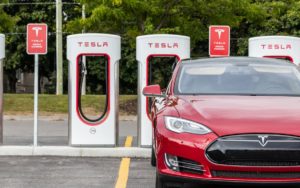Following consultations, the federal agency’s temporary dispensation allows “Level 3+” or DC fast charger operators to bill EV drivers for energy supplied rather than the time spent charging

Public electric vehicle fast charging stations in Canada — including Tesla Superchargers — can bill drivers by kWh, after a new policy decision from Measurement Canada.
Following consultations, the federal agency’s temporary kWh billing dispensation allows “Level 3+” or DC fast charger operators to bill EV drivers for energy supplied rather than the time spent charging
Public electric vehicle fast charging stations in Canada can bill drivers by kWh, after a new policy decision from Measurement Canada.
The agency’s temporary dispensation announcement was on Feb. 20.
Now, DC fast charger stations (referred to as Level 3+) may charge for energy consumed, rather than time spent charging.
“Having determined that this dispensation is in the public interest,” writes Benoit Desforges, acting president of Measurement Canada, in introducing the dispensation’s terms and conditions, “I hereby grant permission to owners of Level 3+ electric vehicle supply equipment (EVSE) to put those meters into service.
“The purpose of this temporary dispensation is to allow owners of Level 3+ EVSE that are already deployed in the Canadian marketplace to use those meters for the purpose of obtaining the basis of a charge for electricity subject to conditions which will help ensure that such charges are based on accurate measurement.”
Fairness for drivers
The government has spent two years looking at the issue of charging station billing.
“FLO strongly supports the development of transparent billing and metrology rules in Canada,” says Elizabeth France, FLO senior legal and public affairs director in response to emailed questions from Electric Autonomy.
“The increased flexibility in how drivers can be billed is great news for drivers and networks.”
In October 2022 Level 2 and Level 1 chargers got approval to have kWh billing . But DC fast charging stations remained a point of contention between EV drivers, charging station operators and the government.
The government defines “Level 3+” as: “a meter that typically uses a 480 V or 600 V input supply capable of producing output voltages ranging from 200 V to 1000 V.”
Industry stakeholders and EV owners say the previous billing scheme (billing by time spent plugged in) is unfair. Some vehicles are unable to accept higher charging speeds. And sometimes an operator’s charger fails to deliver power as quickly as advertised.
Now, all public charging stations may charge for the actual energy vehicles consume. This will bring greater equity among drivers and across all charging sessions.
“While station owners will now have the flexibility to bill based on kWh, we at FLO believe it is important to maintain a range of billing models that include time, energy and hybrid (time and energy) to encourage efficient station turnover and to minimize wait times,” says France.
“This is particularly important where there is still a shortage of public charging sites across Canada.”
Interim solution
Measurement Canada says this “temporary” kWh billing dispensation will be in effect until Dec. 31, 2029. Barring technological setbacks or being deemed no longer in the public service, kWh billing could also be made permanent.
“This temporary dispensation allows the industry to enable “kWh billing” today,” says France.
“December 31, 2029 should provide regulators with sufficient time to develop a final specification for Level 3 charging stations and give manufacturers enough lead time to incorporate new kWh specifications into their products. We expect that after December 31, 2029, new charging stations will be subject to a final specification to be developed by Measurement Canada in consultation with industry.”
Apply in writing
There is a process to begin using the new billing structure. EV station operators need to apply in writing to have their equipment granted the dispensation.
All charging stations installed prior to July 1, 2024 must submit their application to the government by June 30, 2024.
In order to qualify they will need to satisfy a 10-point criteria found on the Measurement Canada site.
All charging stations installed between July 1, 2024 and December 31, 2029 will need to ensure the following:
- Meet all the requirements for Level 3+ EVSE in service prior to July 1, 2024;
- Supply electricity to the purchaser within an acceptable limit of error of ±3%;
- Provide evidence that the EVSE is dispensing electricity within the acceptable limit of error, either by submitting test results for their meters, using a method and testing standard acceptable to Measurement Canada or a letter, report or other similar document from the meter manufacturer, attesting to the accuracy of the EVSE, as established through the manufacturer’s recognized evaluation program; and
- Ensure that every eligible EVSE…is equipped with a metering system capable of measuring the delivered energy.






